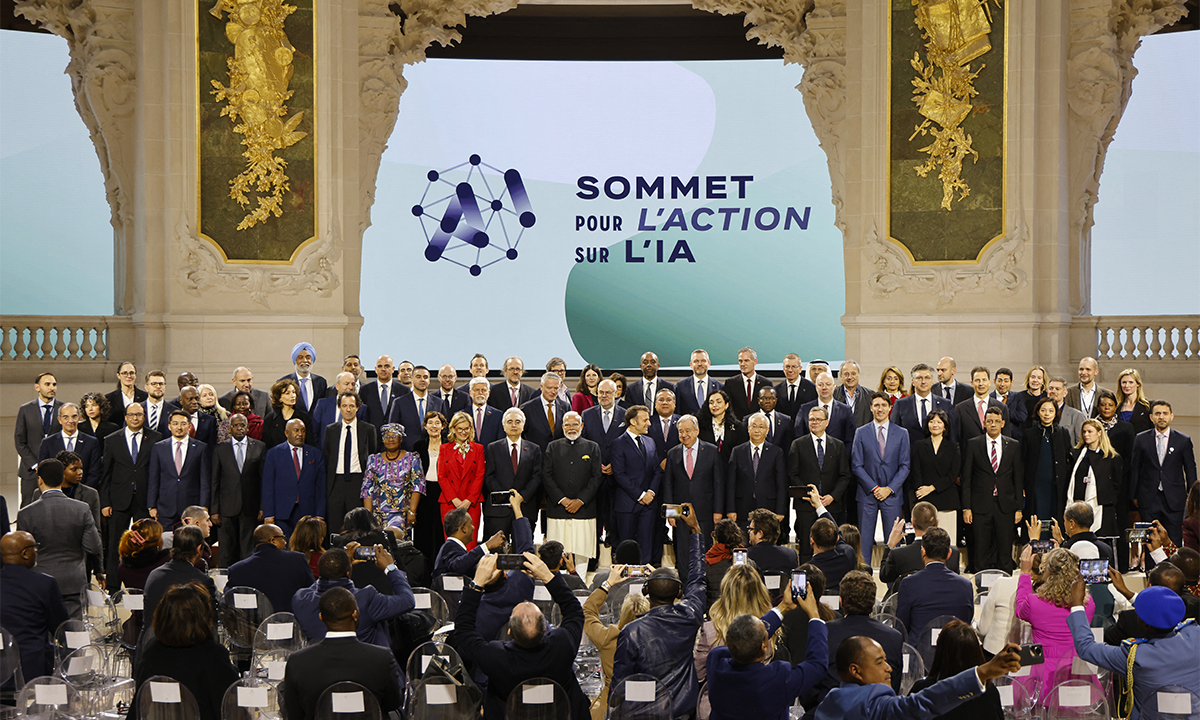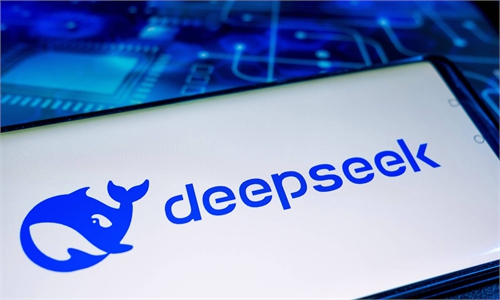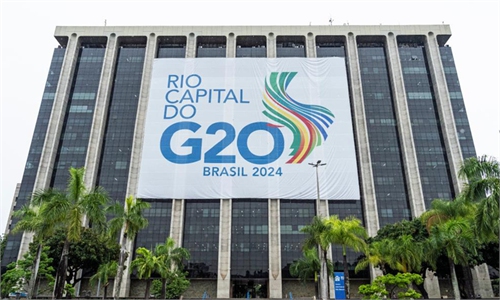A man looks at his mobile phone as he walks past flags during Artificial Intelligence Action Summit at the Grand Palais in Paris on February 10, 2025. Photo: VCG
As the 2025 AI Action Summit begins in Paris, discussions surrounding AI are set against a backdrop of geopolitical tensions and high stakes for the future of global AI governance.
With the aim of addressing how to harness artificial intelligence's (AI) potential while enhancing AI governance, political and industry leaders from more than 100 countries gathered at the Grand Palais in Paris, France for the two-day AI Action Summit, which kicked off on Monday.
The summit focuses on five major themes: Public Interest AI, Future of Work, Innovation and Culture, Trust in AI, and Global AI Governance.
Chinese Vice Premier of the State Council Zhang Guoqing, US Vice President JD Vance, Canadian Prime Minister Justin Trudeau and European Commission President Ursula von der Leyen are among dignitaries attending the summit.
Indian Prime Minister Narendra Modi on Monday left for France to co-chair the AI Action Summit on Tuesday, along with French President Emmanuel Macron, India TV reported on Monday.
On the first day of the Summit, workshops and panels on a wide range of topics are scheduled, including "harnessing AI for the future of work", "privacy, cybersecurity and information integrity," "towards safe and trustworthy AI," and "reinforcing efficient, effective and inclusive global AI governance," according to the organizer's official website.
The Summit of Heads of State and Government will take place on Tuesday with a plenary session to be held at the Grand Palais with international participants to discuss the key common actions to take on AI.
The first and second editions of the summit were held in UK in 2023 and South Korea in 2024, and were both named AI Safety Summit. Compared with previous editions of the summit, the title of the third edition has evolved beyond focusing merely on safety and on a more comprehensive action sphere, so that more attention has and should be given to the global development of AI, Zhu Rongsheng, an assistant researcher at the Center for Strategic and Security Studies, Tsinghua University, told the Global Times on Monday.
As US President Donald Trump tears up his predecessor's AI guardrails to promote US competitiveness, pressure has built on the European Union to pursue a lighter-touch approach to AI to help keep European firms in the tech race, Reuters reported on Monday. Some EU leaders including the summit's host, French President Macron, also hope flexibility will be applied to the bloc's new AI Act to help homegrown startups, said the report.
DeepSeek buzz
An article published on Monday by Associated Press titled "Trump's AI ambition and China's DeepSeek overshadow an AI summit in Paris," which claimed that geopolitics of AI would be in focus in the summit.
Addressing concerns over China's DeepSeek, Macron said in a televised interview on public television channel France 2 that France has no plan to ban it at the moment. "I do not think that it's appropriate to ban a technology because of its country of origin," Macron said, adding that France does not share the US approach of restricting technologies due to its nationality while accepting others.
Indian media platform Policy Circle wrote on Monday that the AI Action Summit is particularly important for India, given recent developments in China. India cannot afford to lag behind and must take lessons from China's AI advancements, particularly in cost-effective model training, it said.
China is embracing the AI transformation and is working hard to advance AI, said Chinese Foreign Ministry spokesperson Guo Jiakun on Monday, in response to extensive attention and heated discussion in the world over DeepSeek, noting that we have helped developing countries enhance capacity building, advocating that AI technologies should be open sourced and there should be greater accessibility to AI services so that the benefits of AI can be shared by all countries.
However, Guo emphasized that we are against drawing lines along ideological difference, overstretching the concept of national security, or politicizing trade and tech issues.
Different approach
The AP report said that "organizers are working on getting countries to sign a joint political declaration gathering commitments for more ethical, democratic and environmentally sustainable AI," adding that it is unclear whether the US would agree to such a measure.
The US position might undermine any joint communique, said Nick Reiners, senior geotechnology analyst at the Eurasia Group. "Trump is against the very idea of global governance," Reiners said, per AP report.
French President Macron rejected an outright ban on Chinese AI, emphasizing careful evaluation based on sovereignty rather than origin. France will closely examine non-European technologies, ensuring they do not compromise security or sovereignty in critical sectors, Macron was quoted by Indian news outlet FirstPost as saying. Macron's stance reflects a desire to avoid isolationist policies like those seen in the US, promoting a more nuanced view of global technology, the report said.
China's and Europe's starting points are to limit the disruptive impact of AI on human rules, while the US is focused on limiting challenges from China, which is a different approach, Wang Yiwei, a professor at the School of International Relations at Renmin University of China, told the Global Times on Monday.
Zhu Rongsheng said that fierce competition between powers could undermine global cooperation, and as the US continues its zero-sum mentality in its pursuit of a bigger share of the market, cooperation would be very challenging in global efforts to jointly develop AI.
DeepSeek provides an opportunity to a broader range of countries and regions and advanced AI can be obtained with relatively low cost, and the model of open-source AI, with proper safeguards, is a practical approach on AI capacity building for good and for all, Zeng Yi, Professor of AI at Chinese Academy of Sciences and member of the United Nations AI Advisory Body, told the Global Times.
The world is big and inclusive enough to have more countries contributing fundamental and pioneering research, as well as industrial applications of AI for global public good, Zeng said.
The integration of AI with industries can unleash tremendous productivity, providing the foundational support and effective empowerment necessary for the liberation of productive forces. In an ideal scenario, this would drive a global effort toward this direction. Otherwise, it could exacerbate the wealth gap, lead to AI exploitation, create new technological oligarchs and power elites, and undermine the general safety and development of countries, widening the gap between countries and between different groups within a country, leading to a new intelligence divide, Shen Yi, a professor at Fudan University, told the Global Times.






No comments:
Post a Comment